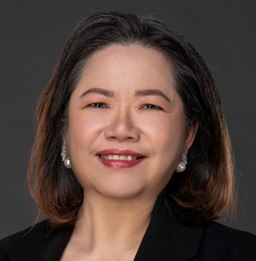

| Monde Nissin


Monde Nissin
Team size: Nine
Key team members: Helen G. Tiu, chief legal counsel
What are the most significant cases or transactions that you have recently been involved in?
Monde Nissin Corporation (MONDE) is a publicly listed company listed on the main board of the Philippine Stock Exchange, and which had the Philippines’ biggest Initial Public Offering (IPO) in 2021 (almost US$1bn). MONDE is a member of the PSEi Index, and principally Philippines-based foreign-owned company incorporated in the Philippines with subsidiaries in Singapore, Thailand, the United Kingdom, New Zealand, among others.
Some of our main activities include: MONDE’s acquisition of a 15% stake in another Philippine Stock Exchange-listed corporation, Figaro Coffee Group (FCG). FCG’s main subsidiary Figaro Coffee Systems (FCSI) is the operator and franchisor of Figaro Coffee (a coffee shop with domestic and international branches), Angel’s Pizza (a pizza store chain), Tien Ma’s (a Taiwanese cuisine restaurant), TFG Express (a multi-brand kiosk selling FSCI’s top products), and Café Portofino (an outlet serving beverage and bakery items intended to operate in schools, universities, hospitals, and offices).
Also, our legal team was key in drafting documentation that represented a significant risk reduction measure to MONDE consisting of a financial support commitment offered by MONDE’s controlling shareholders (through the controlling shareholders’ family holding company, MNSG Holdings) that shall result in a partial reduction of accumulated impairments (if any) recognizable with respect to MONDE’s wholly-owned subsidiary Monde Nissin Singapore’s Meat Alternative Business for the next ten years.
Which recent political, economic or regulatory changes have impacted your work the most in recent years?
A trend that has had and continues to have a substantial impact in my work with MONDE is the increasing trend towards market liberalisation, as can be seen in the recent passage of laws such as R.A. 11647 (amending the Foreign Investments Act), R.A. 11659 (amending the Public Service Act), R.A. 11595 (amending the Retail Trade Liberalization Act), and R.A. 11534 (the Corporate Recovery and Tax Incentives for Enterprises [CREATE] Act), as well as the ever-looming prospect of amendments to the Philippine Constitution’s economic provisions. This trend has opened growth and diversification opportunities for foreign-owned corporations such as MONDE; opportunities which MONDE, as a domestic corporation, is well-positioned to take advantage of. Indeed, MONDE has been enthusiastic and persistent in its efforts to maximise these newly available opportunities through exploration of possible acquisitions, joint ventures, and investments.
This means that now, more than ever, I must keep track of a swiftly changing legal landscape to safely shepherd transactions in pursuit of these new opportunities. While business alacrity and agility remain important, it is equally critical that any transactions pursued through this shifting legal landscape be meticulously planned and carefully executed to comply with requirements of the law, both settled and new, as well as to meet market and consumer expectations. For a publicly listed company such as MONDE, how these transactions will be perceived by investors and regulators is also an indispensable consideration, necessitating a careful, methodical and deliberate approach to the implementation of both strategic projects and short- and medium- term initiatives.
How do you see the general counsel role evolving in the Philippines over the next five-ten years?
As the Philippine markets liberalise and further open to foreign capital and players, Philippine companies are exposed to more competition, but at the same time have more opportunities made available to them. I see the general counsel’s role becoming ever more important for Philippine companies that are looking to remain relevant and want to be able to take advantage of these new opportunities. I believe that there is value in business and management ensuring that in-house legal teams/general counsel are kept adequately and timely informed of strategic goals and day-to-day initiatives; at the same time, it is incumbent on the in-house lawyer to ensure they remain committed to excellence, integrity, and constant improvement especially on arming themselves with emerging legal and business skills – technological advancements in particular, most prominently fintech and AI – that are relevant to the business. This symbiotic dynamic between management and lawyers are mutually beneficial and is in the best interest of the business.
Could you share an example of a time when you came up with an innovation that improved how your legal team works and did not come at a large expense?
As chief legal counsel, I have kept a lean and efficient legal and compliance team – comprising only seven lawyers, one legal specialist, and one legal secretary; this for a multi-national publicly-listed company with a market capitalisation of approximately Php200Bn and more than two dozen subsidiaries across several countries.
I have maintained a hybrid work-from-home setup for my team to decrease overhead costs, and I continuously mentor and train my team to build up in-house capabilities. Recently, I have begun involving team members in potential transactions at an earlier point in the life cycle of such transactions to enable more of the work to be done in-house, and to minimise the costs of external engagements. We engage external counsel when external assistance has become critically indispensable, taking into consideration factors such as transaction size, staffing availability, logistics and legwork, and management preference.